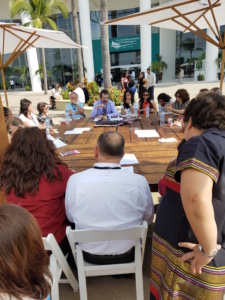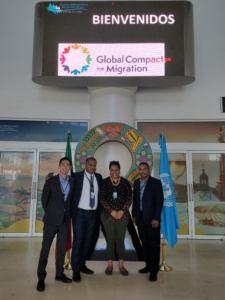The Unitarian Universalist Service Committee advances human rights through grassroots collaborations.
Global Compact for Migration Offers a Strong Signal for the Protection of Human Rights
By on December 21, 2017


L: Representatives from the Mission of Tuvalu to the UN and Palau’s Ministry of Immigration with Salote Soqo, UUSC’s Senior Program Leader R: Civil society groups meeting outside the conference venue
Delegations came together in strength and in unity to improve global governance on migration.
The stocktaking meeting for the Global Compact for Safe, Orderly and Regular Migration which took place in Puerto Vallarta December 4-6, 2017 was “extraordinarily” positive. Extraordinary in the sense that during a time of rising nationalism and xenophobia around the world, there was great convergence amongst delegates to center the global compact on the protection of the rights of all migrants, and that the withdrawal of the United States from the compact did not seem to deter the spirit of the deliberations. What was seen instead was delegations coming together in strength and in unity to improve global governance on migration.
In addition to the unifying call for a human rights-centered compact that respects and empowers all migrants, other messages were loud and clear: the compact should be gender sensitive, respect migrant workers, protect children, counter xenophobia and the criminalization of migrants, encourage data-driven policies, ensure ethical business practices for migrants regardless of their status, uphold existing conventions and treaties, respect national sovereignty and above all else, increase the benchmark for addressing migration.
These are all overlying principles that we must support when it comes to governing all forms of migration, including climate-forced displacement. UUSC hopes that states will adopt these principles in earnest as they develop domestic and regional policies and we encourage states to combine compassion with urgency and diligence as they embark on this historic momentum.
The high number of non-state actors that turned up at the meeting and their engagement since the inception of the global compact has also been encouraging. From faith leaders to labor unions, and other civil society groups, like UUSC – our engagement with state delegations has made this process inclusive. Perhaps it was the scenery that made this meeting so pleasant or probably the fact that we were only a few weeks away from the holidays, but this is the standard that we hope the negotiations will adopt moving forward into 2018 and beyond.